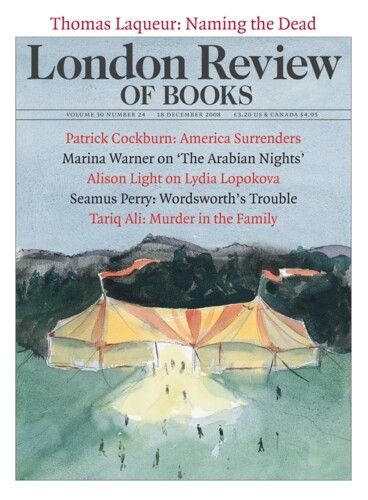Every November, the books pages of British newspapers perform what ought to be a helpful service: they present lists of the best books of the year, to remind us of what we missed. It’s part of the general round of year-end round-ups – 2008’s most significant moments in politics, art, sport, cinema, crime – but it always happens that the annual filing from the world of books is got out of the way early, in order to make room for the acres of larger cultural reflection that mark the actual transition from year X to year Y. This isn’t to say that the books coverage is half-hearted. The Daily Telegraph, for instance, has this time extended its literary survey into a four-day marathon of meticulously catalogued mini-reports on the year’s output that includes everything from Friday’s classics (‘biography’, ‘history’, ‘politics’) to Tuesday’s weird (‘pop music’, ‘knowledge’, ‘food’). You could drown in all this stuff. Where to begin? How to read the lists of what to read?
What we need is an annual list of lists, a ‘books of the year’ of the year, in order to distinguish the workmanlike digest from the magisterial summation. Distinctions are easily made. Most papers aim to be exhaustive, following the New York Times’s more than a century-old tradition of listing ‘100 notable books’ in even-tempered alphabetical order. It’s an egalitarian ideal that British papers can only aspire to, but many bravely attempt authority by delegating the choice to critics with areas of particular expertise: this year, the Financial Times’s analysis of books on ‘Business and Society’ was carried out by Stefan Stern, the FT’s management correspondent (who has been ‘writing about business, finance and management for the past 16 years’). Modelling his technique on that of America’s paper of record, Stern refuses hyperbole (though not superlatives), and sticks to the verified facts. His top choice from the class of 2008 is Mohamed El-Erian’s When Markets Collide: Investment Strategies for the Age of Global Economic Change, a book he commends for having won the unimpeachable Financial Times/ Goldman Sachs Business Book of the Year Award 2008.
There’s a risk, of course, that micro-lists of this sort look like they’ve been written by a committee on committees, which is why, not so long ago, certain anarchic newspapers – the Independent, the Guardian and the Observer – came up with the idea of asking large numbers of writers to recommend whatever they fancied. It’s an approach that leads to a few pleasing surprises, and it has the advantage of being characterful. But a sense of authority is lost. How are we to know for sure that all these people actually believe the books they list are any good, or indeed that they’ve read them? Who’s to say that critic A isn’t novelist B’s best friend, making it all the more possible that the book being raved about has never been opened, or that they share an agent, publisher or nanny? Why should we trust a poet’s opinion of a work on evolution? Of course, these are uncertainties that attend regular book reviews too, so in a way these terse but impassioned recommendations are a purer version of what all papers get up to all the time: they’re a distillation of the art form.
And they are an art form. Jeremy Paxman writes in the Guardian of his unexpected admiration for Joseph O’Neill’s Netherland, a ‘strangely mesmerising’ novel about ‘one man’s obsessive plan to build a state-of-the-art cricket ground in New York’. In the Observer, not wanting to be rude to either sibling of the newspaper family by repeating himself, he writes of his unexpected admiration for Sebastian Barry’s The Secret Scripture, a surprisingly ‘mesmerising’ novel about ‘an old woman inside an Irish loony bin’. The serially mesmerised presenter knows that even a 100-word piece has to have its narrative, its reversals of fortune, whereby the apparent dud turns out to be a vivid gem. When the reviewing is this good it hardly matters which gem we’re talking about.
There’s a practical difficulty with the survey approach: with only so many critics to go round, the papers have to get their requests in early if they’re not to be full of double bookings. The Observer must have been late to the party, but it pulls it off gloriously: not only has it canvassed the views of a leatherworker, a herbalist and a member of the Satanic Sluts, it has also solicited recommendations from some of our leading politicians. Not all of these are edifying, though Lord Adonis’s championing of Christian Wolmar’s Fire and Steam, a history of railways, can’t do any harm to his credentials for his new job at the Department of Transport. And David Miliband ingeniously contrives to include a dig at Sarah Palin, praise for Barack Obama, and a paean to the ‘best instinct of American liberalism’ in 60 words that purport to recommend a book called Counselor.
In this suspicious context, one person shines out for his truth-telling. ‘The book I’ve enjoyed most this year,’ Alastair Darling writes, ‘is Ian McEwan’s On Chesil Beach. It’s a thoroughly evocative novel from one of the best writers of his generation. Reading it was a great escape from the Treasury.’ This is wrong on so many levels that it could only be artless. Or so I thought, until I realised that it’s actually fiendishly clever: in times like these, who’d want a chancellor who took risks on their reading matter, or didn’t like Ian McEwan? What a safe pair of hands. Alastair Darling: winner of the prize for book of the year of the year.
Send Letters To:
The Editor
London Review of Books,
28 Little Russell Street
London, WC1A 2HN
letters@lrb.co.uk
Please include name, address, and a telephone number.

